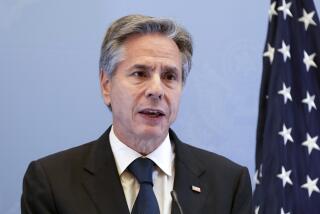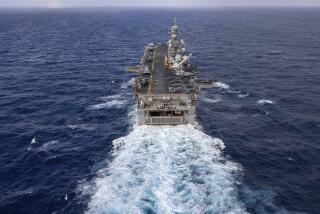Escort of Kuwait Ships to Begin by Mid-July : Reagan Rejects Congressional Advice That U.S. Persian Gulf Operation Be Delayed or Curbed
- Share via
WASHINGTON — President Reagan, rejecting the advice of key members of Congress and pressing ahead with his intention to escort Kuwaiti oil tankers in the Persian Gulf, has ordered the U.S. Navy to proceed with plans and begin the operation by mid-July, the White House announced Tuesday.
“There’s opposition to almost everything we want to do,” Defense Secretary Caspar W. Weinberger told reporters. “But the fact of the matter is that delay is not going to change the issue. Delaying is a prescription for simply not doing it.”
The timing of the plan has been a key issue in recent weeks as members of Congress, concerned about the safety of U.S. servicemen in the region, searched for ways to delay or restrict the operation before it began. The plan, under which 11 Kuwaiti tankers will be escorted, is designed to underscore Washington’s commitment to keeping international sea lanes in the gulf open.
Fear of Armed Conflict
Administration officials had indicated that the escort plan was expected to begin sometime in July. Tuesday’s White House announcement, however, served notice to Congress that Reagan has not been swayed by these objections and remains committed to the plan.
Nevertheless, the Administration, seeking to calm fears that the operation will draw U.S. forces into a military conflict, is trying to focus attention on diplomatic efforts to end the Iran-Iraq War, which has raged in the gulf area for more than 6 1/2 years.
Senior Administration officials said that Reagan is stepping up pressure on members of the U.N. Security Council to support such a diplomatic initiative.
The President ordered Secretary of State George P. Shultz to represent the United States at a Security Council meeting that could take place by mid-July, when the tanker escort plan is to begin. At that session, Reagan hopes to secure the adoption of a resolution calling for an immediate cease-fire in the gulf war and a second resolution that would impose sanctions against either side if it refuses to abide by such a truce.
The two resolutions are supported by the United States, and Shultz’s role reflected what White House spokesman Marlin Fitzwater described as “a major diplomatic initiative.”
In a rare display of unity, the five permanent members of the Security Council--the United States, the Soviet Union, Britain, France and China--have initiated consultations among the 15-nation council in recent weeks to consider joint action to halt the war. The State Department said Tuesday that Shultz hopes those consultations will lead to a formal session.
In addition, U.N. Ambassador Vernon A. Walters is being dispatched to consult with the permanent members of the Security Council in an effort to build support for the resolutions in London, Paris, Moscow and Beijing.
The White House tried to blunt some of the congressional criticism by bringing Weinberger, Shultz, CIA Director William H. Webster and Adm. William J. Crowe, chairman of the Joint Chiefs of Staff, to the White House to brief senior Democratic and Republican congressional leaders on the diplomatic efforts.
‘Unlikely to Sign On’
“The meeting of the big guys was dreamed up as an effort to focus on the diplomatic initiative,” a White House official said, while complaining that the senators and representatives are not likely to relax their opposition. “Politicians being what they are, it’s unlikely any are going to sign on to a policy that puts anyone at risk.”
Spokesman Fitzwater, asked whether any of the approximately 15 congressional leaders attending the morning meeting at the White House voiced support for the naval operation, replied: “Let’s put it this way. There were several who were concerned about timing, about the tactics, and urged the vigorous pursuit of the U.N. diplomatic initiatives that the President outlined.”
The House is scheduled to vote today on two measures that would block, or at least delay, the escort plan. The Democratic leadership believes that it has the votes to pass a measure through the House requiring a 90-day delay but concedes that it has no chance of passing the Senate or being signed into law, California Rep. Tony Coelho (D-Merced) said.
In the Senate, the Foreign Relations Committee, voting 11 to 8, approved legislation to block the plan, but Senate Majority Leader Robert C. Byrd (D-W.Va.) said he will oppose bringing that resolution to the floor.
Congressional Democrats, expressing disappointment over Reagan’s reaction to their criticism, conceded that there is little they can do to force him to change his mind.
House Speaker Jim Wright (D-Tex.) said, “We don’t honestly think, given the time schedule, that it is possible . . . to effect a delaying of this action.” But he said some of the House and Senate leaders urged Reagan to delay the operation anyway out of concern “that we are on one side of a war” and may “slip and slide our way into the role of active participant.”
Sen. Alan Cranston (D-Calif.) said the Administration “is simply going it alone to protect oil that we do not use and to protect allies who refuse to help. We’re heading for another Beirut.”
Under the Administration’s escort plan, 11 Kuwaiti tankers will be re-registered to fly the American flag, giving them U.S. military protection. The plan faces strong opposition, particularly after an Iraqi jet fighter attacked the U.S. guided missile frigate Stark in the gulf in mid-May. Iraq said the attack, which killed 37 sailors, was a mistake.
The Iraqi attack was similar to hundreds of others in the so-called “tanker war” in which Iran and Iraq have expanded their ground conflict to hit tankers and other vessels plying the passage between the northern gulf ports and the Strait of Hormuz to the south.
Times staff writer David Lauter contributed to this story.
More to Read
Sign up for Essential California
The most important California stories and recommendations in your inbox every morning.
You may occasionally receive promotional content from the Los Angeles Times.













